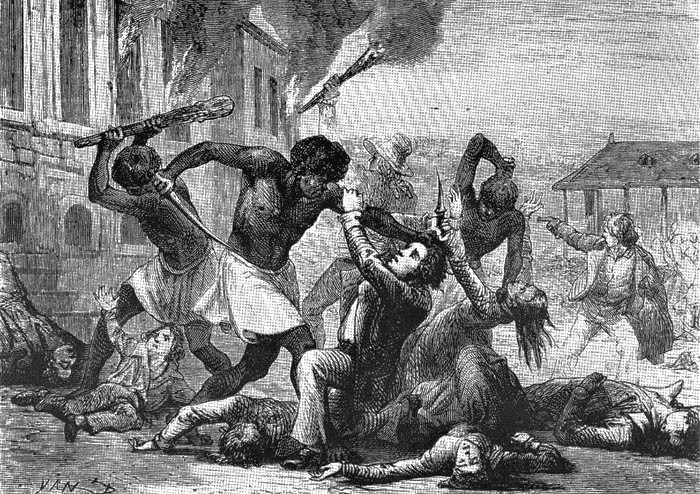When understanding the French and Haitian revolutions, it is important to note that several political philosophies were used to not only sway public approval, but for forceful government upheaval. The political philosophy responsible for violent revolts is the concept of fear and terror, which was used by the leader during the Haitian revolution, Jean-Jacques Dessalines, and the leader of the Committee of Public Safety during the French revolution, Maximilien Robespierre. The connection between these two revolutions suggested that a common philosophy was utilized to dispose of the standing government. Despite terrible human, monetary, and social costs, the French and Haitian revolutions were able to propel the idea of democracy and the ideal of equality through violence against ruling figures like the French monarch and French colonists, respectively. While there’s wide focus on domestic events in France and Haiti individually, it is often forgotten that these revolutions’ effects reached beyond France and Haiti; other slave institutions in the Western Hemisphere were empowered by the Haitian revolt, while European empires feared the destructiveness of it. By analyzing how fear and terror influenced the politics in France, Haiti and beyond, one can achieve an extensive understanding of the sacrifices in a successful revolution both as individual cases and as connected counterparts.
The leaders of the French revolution and the Haitian revolution both used fear and terror to overthrow the government forcefully. The French insurrection was driven by conflicts between varying social classes and the monarchical government. The people of France were unsatisfied with overtaxing. unemployment, forced religion, and unpaid labor; all which were results of a failing monarchy. The revolutionary, Maximilien Robespierre, led The Terror of 1793, executing thousands who were deemed enemies of the upheaval. Robespierre fought for the rights of public interest, therefore was able to justify these purges in his speeches, driving rhetoric like “Terror is nothing other than justice, prompt, severe, inflexible; it is therefore an emanation of virtue”. Looking at this event from an exterior perspective, Robespierre and his people could be seen as vicious killers who put France’s security into jeopardy. However, from the perspective of the French citizens, it is clear that the general public was exhausted with the monarchy’s unreasonable demands. Pre Revolutionary France, social classes were disconnected and only involved with issues that pertained to their own interests. The struggle and need for revolution united nobles and peasants alike, creating a stronger force to challenge the government. The only way to successfully follow through with a revolution was through violence. There was no possibility of pressuring the monarchy diplomatically, which left Robespierre and the Committee of Safety to resort to murdering anyone that opposed them. The methods of justification that Robespierre used helps us visualize the correlation between terrorism and upheaval.

By understanding the reasoning behind the mass killings and the desired result it brought out in France, one can apply the same concept of terror to a context in pre-independent Haiti. Jean-Jacques Dessalines, a Haitian revolutionary, gave a speech addressing the Haitian people. In this speech, Dessalines justifies killing French people on the island by saying it was a form of vengeance for all the oppression the enslaved people had faced as a French colony. He states, “It is necessary, in order to strengthen these ties, to recall to your remembrance the catalogue of atrocities committed against our species: the massacre of the entire population of this Island...by the French”. Jean-Jacques Dessalines is using their trauma as reason for public execution of the remaining French people in Haiti. Dessalines goes on to declare, “‘War and Death to Tyrants!’ this is my motto; ‘Liberty! Independence!’ this is our rallying cry”. Nationalism and unity were main components that fueled the enslaved population to seek equity by inflicting terror on their French oppressors. Without a strong sense of justice, the revolution wouldn’t have reached that degree of success. Contextually, terror was indisputably necessary for their independence.
Understanding of the French and Haitian revolutions are often confined to domestic events like revolutionary terrorism and installment of new government. What is left out of the understanding is the collateral effects, even though they are just as important to consider when developing a broader understanding of the revolutions. For example, although fear and terror ultimately succeeded in the revolts, it was extremely destructive, taking countless lives from both sides. The mortality rate of the Haitian revolution aroused public fear among European governments who owned slave colonies. They feared insurrections in their own plantations. In historian Robert W. Strayer’s Ways of the World, he says “To whites throughout the hemisphere, the cautionary saying ‘Remember Haiti’ reflected a sense of horror...and a determination to not allow political change to reproduce that fearful outcome again”. The countless deaths as a result of the Haitian revolution affected other colonies in the Western hemisphere by raising the cautiousness of the enslavers. On the contrary, there were also positive collateral effects on the enslaved populations in the European colonies. Many enslaved people felt inspired and proud of their Haitian counterparts and resisted their own enslavers. The insurrection in Haiti served as an example of slave rebellion in Jamaica and other Carribean islands. The contagiousness of revolutions proves that the radical philosophies used in France and Haiti were also used in other countries.
In conclusion, the usage of fear and terror in the French and Haitian revolution was the only resort in overthrowing the government. It is rare to find a case where revolution was achieved through diplomacy. Fear and terror is a valuable resource in determining the common result of corrupt governance. Revolutionaries justified killing thousands for the sake of toppling oppressive systems, which tells us that governance cannot be challenged without great loss to the country. Whether it’s dissatisfaction in a monarchy or a distant colonial power, violence and destruction is intrinsic in government upheaval.